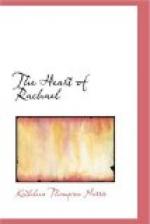“Shell I bring up some candles from suller; we ain’t got much karosene!” Florrie, the one maid, demanded excitedly. Chess, the hired man, who was Florrie’s “steady,” began to bring wood in by the armful, and fling it down by the airtight stove that had been set up only a few days before.
The wind began to howl about the roof; trees in the dooryard rocked and arched. Darkness fell at four o’clock, and the deafening roar of the ocean seemed an actual menace as the night came down. Chess and Florrie, after supper, frankly joined the family group in the sitting-room, a group composed only of Rachael and Mrs. Dimmick and two rather terrified young stenographers from the city.
These two did not go to bed, but Rachael went upstairs as usual at ten o’clock, and drifted to sleep in a world of creaking, banging, and roaring. A confusion and excited voices below stairs brought her down again rather pale, in her long wrapper, at three. The Barwicks, mother, father, and three babies, had left their beach cottage in the night and the storm to seek safer shelter and the welcome sound of other voices than their own.
After that there was little sleep for anyone. Still in the roaring darkness the clocks presently announced morning, and a neighbor’s boy, breathless, dripping in tarpaulins, was blown against the door, and burst in to say with youthful relish that the porches of the Holcomb house were under water, and the boardwalk washed away, and folks said that the road was all gone betwixt here and the lighthouse. Rain was still falling in sheets, and the wind was still high. Rachael braved it, late in the afternoon, to go out and see with her own eyes that the surf was foaming and frothing over the deserted bandstand at the end of the main street, and got back to the shelter of the house wet and gasping, and with the first little twist of personal fear at her heart. Suppose that limitless raging green wall down there rose another ten—another twenty—feet, swept deep and roaring and resistless over little Quaker Bridge, plunged them all for a few struggling, hopeless moments into its emerald depths, and then washed the little loosely drifting bodies that had been men and women far out to sea again?
What could one do? No trains came into Quaker Bridge to-day; it was understood that there were washouts all along the line. Rachael sat in the dark, stuffy little sitting-room with the placid Barwick baby drowsing in her lap, and at last her face reflected the nervous uneasiness of the other women. Every time an especially heavy rush of rain or wind struck the unsubstantial little house, Mrs. Barwick said, “Oh, my!” in patient, hopeless terror, and the two young women looked at each other with a quick hissing breath of fear.
The night was long with horror. There were other refugees in Mrs. Dimmick’s house now; there were in all fifteen people sitting around her little stove listening to the wind and the ocean. The old lady herself was the most cheerful of the group, although Rachael and one or two of the others managed an appearance at least of calm.




